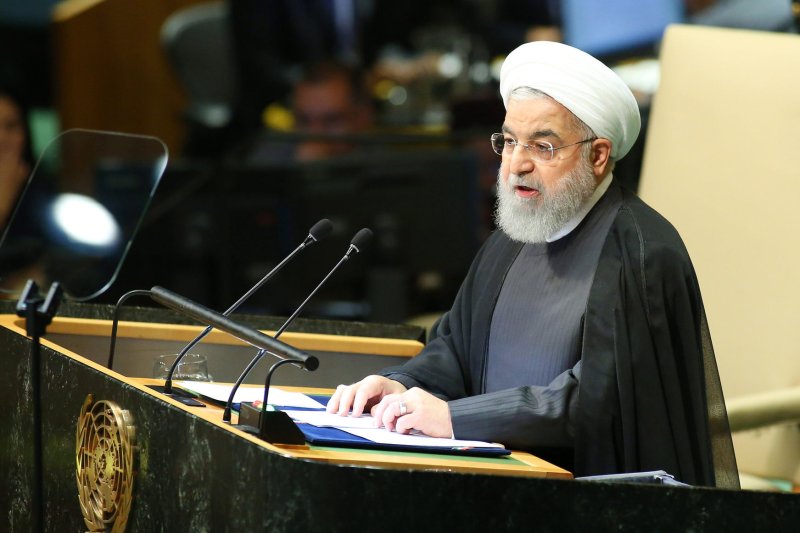1 of 2 | Hassan Rouhani, president of Iran, speaks at the United Nations General Assembly in New York on September 25. Photo by Monika Graff/UPI |
License Photo
Oct. 3 (UPI) -- Panicking at the continuing strikes and protests that have crippled the Iranian economy, the besieged mullahs have resorted to torture and arbitrary executions in an attempt to intimidate the Iranian population.
On Sunday, Iranian state television reported that three businessmen had been sentenced to death and 32 other defendants sentenced to terms of imprisonment of up to 20 years for economic crimes. Supreme leader Ayatollah Ali Khamenei has demanded "swift and just" legal action to be taken in what he regards as an economic war being waged by "foreign enemies." His call for action is a barefaced effort to divert attention from the massive corruption that he himself and his coterie of crooked mullahs have perpetrated for the past four decades.
As U.S. Secretary of State Mike Pompeo said, "To the regime, prosperity, security and freedom for the Iranian people are acceptable casualties in the march to fulfill the revolution." He accused the clerical regime of "lining its own pockets while its people cry out for jobs." Pompeo has provided specific examples of the industrial-style corruption in Iran, citing Sadeq Larijani, the head of Iran's judiciary, who is worth an estimated $300 million, embezzled directly from public funds. He also cited former Islamic Revolutionary Guard Corps officer and Minister of the Interior Sadeq Mahsouli, who is nicknamed "the billionaire general." Pompeo said he went from being a poor IRGC officer at the end of the Iran-Iraq war to being worth billions of dollars. He identified Grand Ayatollah Makaram Shirazi, who is known as the "sultan of sugar" for his illicit trading of sugar, which has generated over $100 million for him. And he said that Khamenei "has his own personal, off-the-books hedge fund called the Setad, worth $95 billion."
Pompeo concluded that judging by their vast wealth, the ayatollahs "seem more concerned with riches than religion." He continued: "These hypocritical holy men have devised all kinds of crooked schemes to become some of the wealthiest men on Earth while their people suffer." This crushing exposé by the U.S. secretary of state gives the lie to Khamenei's contention that "foreign enemies" are to blame for Iran's economic collapse. The extent of corruption by the mullahs is well-known to the Iranian people, who are sick of seeing their rich oil and gas wealth stolen and used to fund proxy wars in Syria, Yemen, Lebanon and Iraq and to fill the bank accounts of the mullahs, while they starve.
The rising costs of tires, spare parts and fuel, combined with weeks of unpaid wages, are behind the nationwide protests by truckers that have erupted again in Iran. Video clips on social media have shown hundreds of trucks standing idle in at least six regions, including Ahvaz, Ardabil, Borujerd, Qazvin, Shahreza and Urmia. Reacting to the strikes, a spokesman for the Iranian Judiciary, Gholamhossein Mohseni Ejei, warned the truck drivers that they would face "harsh penalties" if they continued their protests. He said that special Islamic revolutionary courts had been set up to try suspects quickly for "spreading corruption on earth," a capital offense under Iran's Islamic laws. He threatened that striking truck drivers would be held liable under the rules and regulations applying to banditry, stating that the punishment for bandits is very severe, often resulting in the death penalty.
Threatening the death penalty for striking truck drivers is an indication of the depths of depravity to which this criminal regime has sunk. The rial currency has lost about 70 percent of its value since April under the threat of revived U.S. sanctions, with a heavy demand for dollars among ordinary Iranians trying to protect their savings. The cost of living has also soared, sparking sporadic demonstrations against profiteering and corruption, with many protesters chanting anti-government slogans.
The main democratic opposition, PMOI aka MEK, has set up "resistance units" across the country, which have played a leading role in these protests. The opposition leader Maryam Rajavi has praised the strikers in Iran, describing the vindictive threats of the clerics against the dignified and hardworking drivers as a reflection of the growing crisis of the clerical regime. Rajavi has called for the Iranian people to back the strikers and has concluded that only regime change and the overthrow of the corrupt and belligerent mullahs will bring about a restoration of peace and prosperity in Iran and the wider Middle East.
Kurt Cobain, the late American rock star, famously said, "The duty of youth is to challenge corruption." His words should resonate with the youth of Iran.
Struan Stevenson, coordinator of Campaign for Iran Change, was a member of the European Parliament representing Scotland (1999-2014), president of the Parliament's Delegation for Relations with Iraq (2009-14) and chairman of Friends of a Free Iran Intergroup (2004-14). He is an international lecturer on the Middle East and president of the European Iraqi Freedom Association.















